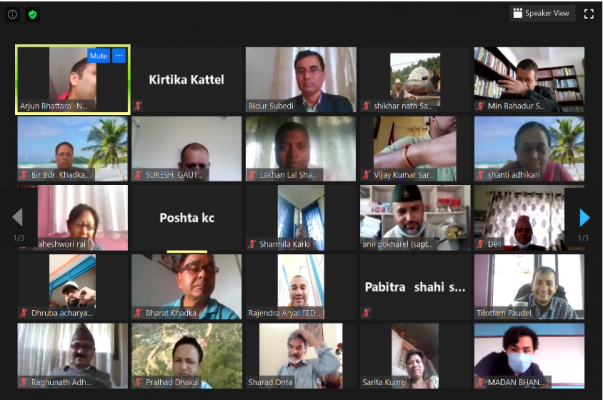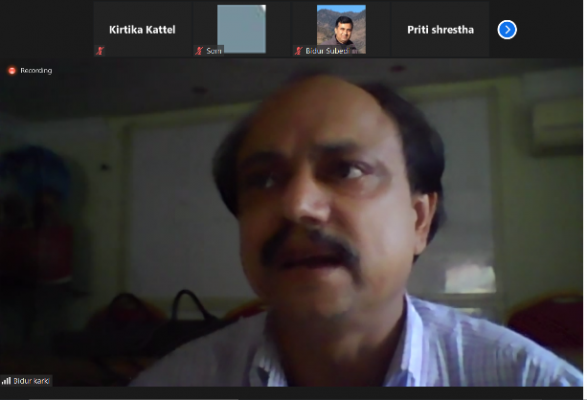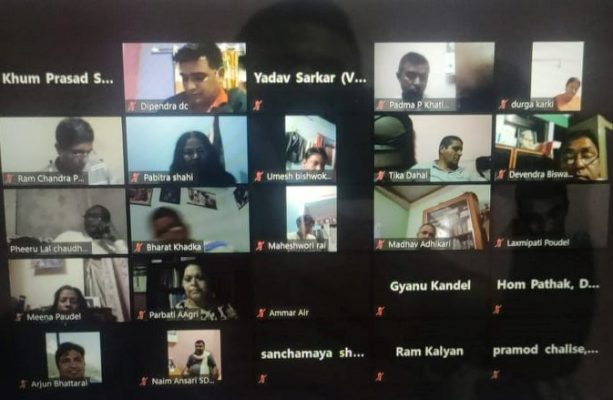National Civil Society Forum on Development Effectiveness (Nepal’s Post-Disaster Reconstruction Initiatives)
Declaration
24 June 2015
Preamble
We, the representatives of various federations, alliances, networks of citizen forums, human rights activists, journalists, development workers, community-based organisations, cooperatives, researchers, youths, rural and urban poor, farmers, organisations working with women, children, senior citizens, indigenous people, Dalits, persons with disabilities, and the sexual minorities, across Nepal, solemnly express our profound sorrow and solidarity to all affected people and communities of the unprecedented catastrophe that struck us in the form of a major earthquake of 7.8 magnitude on 25 April 2015 and the consequent aftershocks. We offer our heartfelt condolences to all those who have lost loved ones, prayers for the departed souls, and wish speedy recovery of those injured. We highly appreciate the generous and overwhelming expressions of support and assistance offered by a wide range of stakeholders including the government of Nepal, civil society forum, international community, private sector, and the Nepali diaspora. The rescue operations, relief distribution, and monitoring of the overall situation in the immediate aftermath of the earthquake was made possible by their collective effort. Even as we are deeply saddened by the fact that more than 16 districts, 900 VDCs, and innumerable settlements and hamlets have been severely affected and that more than five million residents have suffered physically and mentally, we are inspired beyond words by the tenacity and resilience of the affected people, and by the ingenuity of communities in coping with the disaster through indigenous and local knowledge, resources and techniques. We are concerned about upholding the social justice and economic, social and cultural rights of the multicultural landscape of quake-affected areas constituting a diverse population (over 53 % indigenous communities, 33% hill caste, 55% women, 6% Dalit, nearly 1% Madhesi and Muslim each and nearly 0.05 % foreigner). Among all the indigenous peoples, the Tamang community is most seriously affected by the earthquake. We are deeply concerned about specific needs, priorities and urgencies of these voiceless survivors at this hour. We realise the need of consolidating the voice of civil society across Nepal for generating efforts to ensure the rights of the affected people and communities based on the principles of equity, justice and humanitarian accountability by complying with the international instruments on human rights and humanitarian law, and to contribute for extending support for Nepal’s reconstruction based on and as mandated by the Paris Declaration on Aid Effectiveness, Accra Agenda for Action (AAA), and Busan Outcome Document, policies being framed for sustainable development goals (SDGs), as well as LDCs Istanbul Programme of Action (IPoA). We underline the need of better coordination among all stakeholders including CSOs and ensure that any contributions being made from within and outside the country should be effective, efficient and sustainable, and genuinely address the need of the affected people and communities.
To this end, we have come together to put forward this civil society Declaration on Development Effectiveness in the context of Nepal’s Post-Disaster Reconstruction Initiatives in Kathmandu on 24 June 2015. We urge the followings:
On Relief, Rehabilitation and Reconstruction
1. We recognise the urgency of addressing the specific needs and priorities of the affected people and communities based on humanitarian grounds, ensuring human rights and dignity of the people. We urge government agencies to create enabling environment for civil society, especially for monitoring assistance and relief distribution ensuring gender equity and equality. We also urge the government to incorporate the role of CSOs in any rescue and relief operation guidelines, decisions and their disseminate circulars at centre, district and community levels in all phases of disaster management including rescue, relief, rehabilitation, resettlement and reconstruction.
2. We call upon the Government of Nepal to create a conducive atmosphere required to promote a meaningful engagement of CSOs in assisting the local administration to provide emergency needs ensuring proper public information related to the disaster and response through media/community media, in relation to medical treatment and quality food commodities, shelter in the affected areas, and so on. The public’s right to information on all governmental activities must be ensured.
3. It is our firm opinion that any reconstruction work in the immediate and longer term should promote use of local resources including water, forest, social capital, tourism and indigenous knowledge (particularly with Dalits and indigenous communities) while ensuring full respect of local culture, customs and needs of local communities.
4. While recalling the government’s responsibility of ensuring civil, political, economic, social and cultural rights as fundamental rights of the people, especially in view of its endorsement of nearly two dozen human rights instruments, we would like to draw attention of the government to ensure that all the procedures, plans and processes for reconstruction and rehabilitation are human rights friendly. The government must not curtail rights of the people provided by the constitution under any pretext including in the declaration of earthquake affected area as ‘crisis zone.’ In this respect, we also urge the government to promote a sense of calm and confidence in order to help survivors normalize their lives.
5. We are deeply concerned towards over politicization, nepotism, partiality, misuse, mismanagement, food adulteration, and matters coming up as ‘corruption’ in distributing relief materials in the highly affected areas. We urge the government to design environment friendly plans construction and reconstruction of infrastructure works, while being mindful of any negative cost in the longer run. Also, we urge public infrastructure to be disabled and senior citizen friendly.
6. We are committed towards ensuring that future generations of Nepali citizens find easier ways to cope with similar crisis at different times in the future. Thus, we place high value on raising Capable Future Generation to Mitigate Disaster by mobilising the present day youths. In this respect, we urge the Government of Nepal to generate disaggregated archive/data bank of the overall losses due to the earthquake by mobilizing and coordinating with the expert organisations both in the government and non-government sectors.
7. We are concerned about the violations of rights, discrimination, violence against women and children on ground of gender, sex, caste/ethnicity, culture, customs and social practice. We urge the government to promote and protect the specific needs and priorities of the vulnerable people at this hour of emergency. We urge the government to pay special attention by developing special mechanisms towards fulfilling the rights of communities including endangered communities (Thami, Jirel, Baramo, Chepang, Hyolmo, Hayo etc.) with their prior consent ensuring right to information through the formulation of appropriate policies, and rehabilitation and reconstruction programmes.
8. We are concerned with lack of timely response by the government, particularly in remote locations that are difficult to access by road transportation and air transportation. We call upon the government to provide immediate priority for the relief and rehabilitation in such locations. We urge the international community to assist the Government of Nepal unconditionally in view of humanitarian accountability.
On Development Effectiveness
9. We commit to play a catalytic role for recovery and want to play watchdog role, based on the principle of continual improvement, for monitoring the development initiatives performed under reconstruction and resettlement packages of government and international communities. We urge international agencies to mobilize domestic expertises and respect dignity of the affected people and communities.
10. We urge the government to ensure meaningful participation of the CSOs in all phases of reconstruction, that is, policy and programming, such as disaster management bill with wider consultation with CSOs, implementation and ensuring monitoring by clearly recognising their roles and responsibilities. We urge the government to develop policy framework and country strategies through multi-stakeholder participation ensuring meaningful participation of women based on inter-sectionality and social inclusion approach and set the policies, standards and timeframe to ensure the quality performance of implementing agencies in order to materialize the Post-Disaster Need Assessment (PDNA) into action.
11. We are deeply concerned about the formation of the Reconstruction Authority of the government through an ordinance without consultation with CSO and relevant stakeholders. We stand on our position that formation of such authorities should adhere to the democratic norms and values and should be free from any political interference.
12. We are concerned over rumours regarding international aid flow violating mandates especially by minimizing the roles of the local organisations regarding supply and distribution of relief support to the affected communities. We urge the development partners to spend the earmark budget in partnership with government, CSOs and national institutions. We urge both the government and the international community to enhance collaboration and cooperation with the CSOs at national and local level.
13. We urge both the government and international community to adhere country system, process and ownership in receiving any support, funds as well as monetary and non-monetary cooperation from the international communities ensuring harmonisation and mutual cooperation. Government should develop its national strategy to manage the sources of funding. It should give priority to domestic resource mobilization, cut off unproductive expenditure, enhance efficiency and effectiveness of its entire mechanisms to absorb the available resources. Bureaucratic hurdles and operational bottlenecks should be fully removed for the effective implementation of plans and programmes.
14. We are deeply concerned about the democratic participation of people and communities during reconstruction and resettlement planning process. Therefore, we urge the government, political parties and concerned authorities to immediately schedule the election of the local governments and pave the way for meaningful participation of elected local representatives that ensure democratic reconstruction and resettlement as demanded by the crises.
15. We urge the government for promulgating Land Use Act in order to implement its land use policy. Reorganizations of settlements and urban development plans are required through geological studies in the whole country. We are concerned that government should amend procurement act and regulations and land accusation laws as soon as possible, which are prerequisites for reconstruction works.
16. We call government and all development partners to focus its activities to reinstate the sustainable livelihoods that lead to the affected areas towards self-reliant economy ensuring food security, fair market and consumers’ rights and self-employment. We urge the government and international agencies to encourage the affected people to get involved in productive sectors and revive supply chain system.
17. We urge the government to monitor the resource mobilization patterns, way of actions and the activities of international agencies. Also, we urge the government to take actions to those agencies, which are not responsible, transparent and do not follow country system and national policies.
On Debt Cancellation
18. Since Nepal is a party to LDC Group, we urge the government to be consistent in calling for full cancellation of international debts (public and private) as agreed by the United Nations (UN) General Assembly in its resolution 68/224 (adopted at 68th session in 2013 vis-a-vis Follow-up to LDC-IV conference) and in line with GA decision contained in OP 16 of the GA resolution 61/188 (adopted at 61st session in 2006) which states if a country fulfils the criteria of being an LDC it is eligible for debt write-off. The fund thus saved must be used for post-disaster recovery, reconstruction and rehabilitation.
19. We request that the international community respond to Nepal’s civil society’s voice on debt cancellation for Nepal at this hour of emergency as per the commitments of the resourceful member states of the United Nations and international agencies.
20. We urge the international community to realize their pledges and commitments made at different fora while responding to the specific needs and priorities at a time when Nepal is passing through most difficult time of its history responding the unprecedented crisis.
21. We are equally concerned that government should guarantee optimum utilization of available financial resources. We ask the government to adopt “Zero tolerance to corruption”. Transparency and accountability should be fully ensured at all levels for programming, budgeting and implementation in the entire process of rehabilitation and reconstruction. We urge the government, international community and the CSOs as well as private sector to put into practice social audit of their activities they have carried out in the post-disaster response.
22. Taking this as our own accountability, we commit our constructive engagement in the process of monitoring the post-disaster situation for the sake of development effectiveness, equitable and judicial mobilisation of resources provided that the government creates enabling environment for the CSOs. We urge the government to form a monitoring team including experts in the related filed for the effective implementation of the PDNA.



